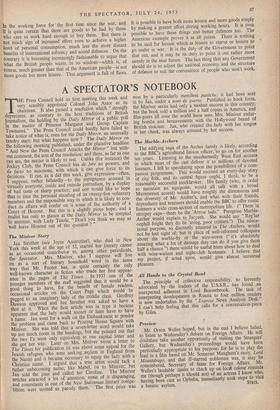, Jan Struther (née Joyce Anstruther), who died in New
York this week at the age of 52, started her literary career as an occasional 'contributor to, among other periodicals, the Spectator. Mrs. Miniver, who I suppose will live on as a sort of literary household word in the same way that Mr. Pooter has, is quite certainly .the only well-known character in fiction who made her first appear- ance in the pages of The Times. In 1937 one of the younger members of the staff suggested that it would be a good thing to have, for the benefit of female readers, occasional articles on the Court Page which would be pegged to an imaginary lady of the middle class. Geoffrey Dawson approved and Jan Struther was asked to have a shot at it. When the first article was in type it became apparent that the lady would sooner or later have to have a name. Jan went for a walk on the Embankment to ponder the problem and came back to Printing House Square with Miniver. She was told that a seven-letter word would take up too much room in the headings, but she pointed out that the two I's were only equivalent to one capital letter and she got her way. Later on Mrs. Miniver wrote a letter to The Times for publication (it was about some appeal for the Jewish refugees who were seeking asylum in England from the Nazis) and it became necessary to equip the lady with a ' Christian name. I argued. that a true artist would tack a rather unbecoming name, like Mabel, on to Miniver; but Jan sold the pass and called her Caroline. The Miniver articles attracted a -lot of attention, some of it disparaging, and contestants in one of the New Statesman literary .compe- titions were invited to parody them. The first prize was won by a particularly merciless pastiche; it had been sent in by Jan, under a nom de guerre. Published in book form, the Miniver series had only a modest success in this country; but the book sold a million and a half copies in America, and film-goers all over the world have seen Mrs. Miniver endur- ing bombs and bereavements with the Hollywood brand of British stoicism. Jan, who created the lady with her tongue in her cheek, was always amused by her success.


























 Previous page
Previous page